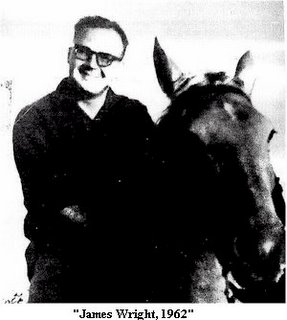Dead Crush #9

Oh James Wright:
What I keep wondering when I read your poems is if your existence in death is everything you’d hoped it would be. I don’t necessarily get the impression from your work that you want to die, but that somehow your questions about the world would have clearer answers if you didn’t have a human body. So I hope whatever vehicle carts your soul around these days is more appropriate for you. Or that you have done away with bodies altogether, and you have other things to think about besides the world.
Your poems have an otherworldly feeling, as though they are somewhere between this world and the next. The people that populate these poems also teeter on this edge—they border on no longer being human; they are turning into something else. The poem “Evening” takes place on earth, but with a character who straddles earth and another world. The speaker watches a boy turn from human to some kind of walking representation of nature (is this a figure from mythology? I can’t remember): “I saw his hair turn leaf/ His dancing toes divide/ To hooves on either side/ One hand become a bird.” The boy is part animal, part tree—he embodies all that the speaker (you) wish to understand but cannot. Fear overtakes you, but when this new creature dissolves back into a human, he understands “Fairy and ghost—but less/ Our human loneliness.” How much easier it would be to live in the world in this way—without knowledge of loneliness. In this way, your writing reminds me so much of Rilke, who often looks to nature to try to understand how to live. I’m thinking of the Eighth Elegy:
With all its eyes the natural world looks out
into the Open. Only our eyes are turned
backward, and surround plant, animal, child
like traps, as they emerge in their freedom.
We know what is really out there only from
the animal’s gaze; for we take the very young
child and force it around, so that it sees
objects—not the Open, which is so
deep in animals’ faces. Free from death.
We, only, can see death; the free animal
has its decline in back of it, forever,
and God in front, and when it moves, it moves
already in eternity, like a fountain.
“Natural” beings don’t understand death, which is why they can live in freedom. Loneliness, for you, seems like a branch of death—without knowledge of death, there wouldn’t be loneliness, because without knowledge of death, we wouldn’t need to surround ourselves with the others who also know that they're going to die. To lose one’s body, to not be human, is the only way to know more about the world of ghosts than the human world of loneliness. But to lose your body, you have to die. Your poems seem to want to figure out how to lose your body without dying, and maybe this is why there are so many ghosts in your poems—they are both part of the living and part of the dead.
Another way to not be human and yet still experience the nature and the world in which it exists is to be an animal. As Rilke writes, animals have death behind them, and so can live naturally in the world. I see the same kind of existence of animals in your work. In “By a Lake in Minnesota,” the world feels full of animals—the twilight is a whale, beavers walk silently from their calm waters, and the moon itself hunts for dolphins. There seems to be no room for humans in this kind of world—and these animal figures certainly don’t need us in order to keep doing what they do. This world was made for them. The only human in the poem, you, stands and watches this, and all you can do is wait for dark in a world that functions so well without you.
The horses in “A Blessing” also exist quite easily without you. I guess the question is, can you exist without them? The horses here have been “alone” all day, though they had each other—it is hard to see them existing without our vision—do things exist without our interpreting them? In this moment it seems that you understand these animals as you haven’t before—instead of the distant watching you do in “By a Lake in Minnesota,” you have somehow, for a moment, entered their world, become one of them, because you see them as lonely. Or perhaps it is they who have entered your world. It is now that you realize that without a body, you would “break into blossom”—finally become a part of nature, as the boy did in “Evening.”
In “A Dream of Burial,” you dream of dying. You are only a foot and a shoulder. You can still hear what is going on in the earth above you. And now you are waiting for nature to take you—your body is finally disappearing. And when it goes, maybe you will join the ranks of the animals at last, those beings that get to live in the world and not interpret it—or take you to a place where there is no death, no loneliness. It is fitting that the angel who waits for you is a horse—that he’s the one that can take you where you want to go.
(Happy Birthday, my dad of poetry...I'm sorry it was all so hard)

2 Comments:
"I laugh, as I see him abandon himself / To entire delight, for he knows as well as I do / That the branch will not break."
I had forgotten that his most important collection took its title from a poem called "Two Hangovers."
I always loved teaching that poem to a room full of undergrads.
Post a Comment
<< Home